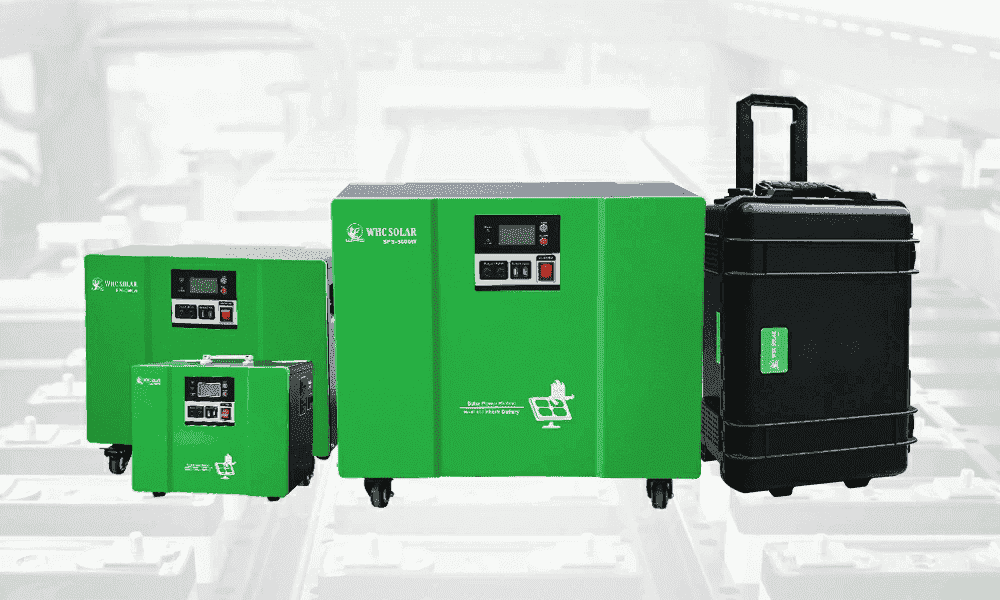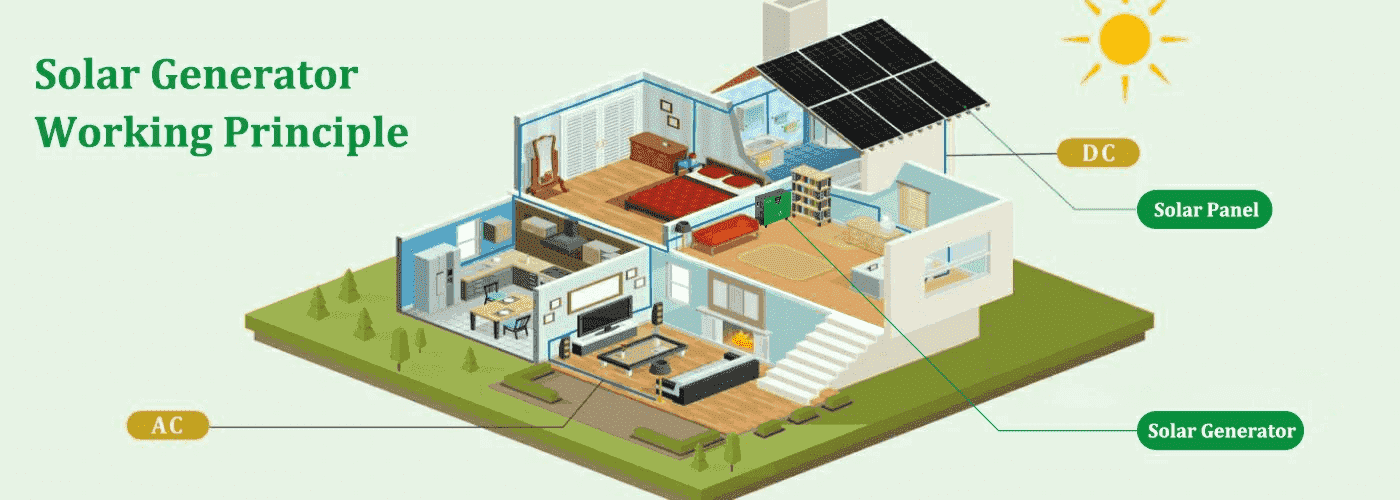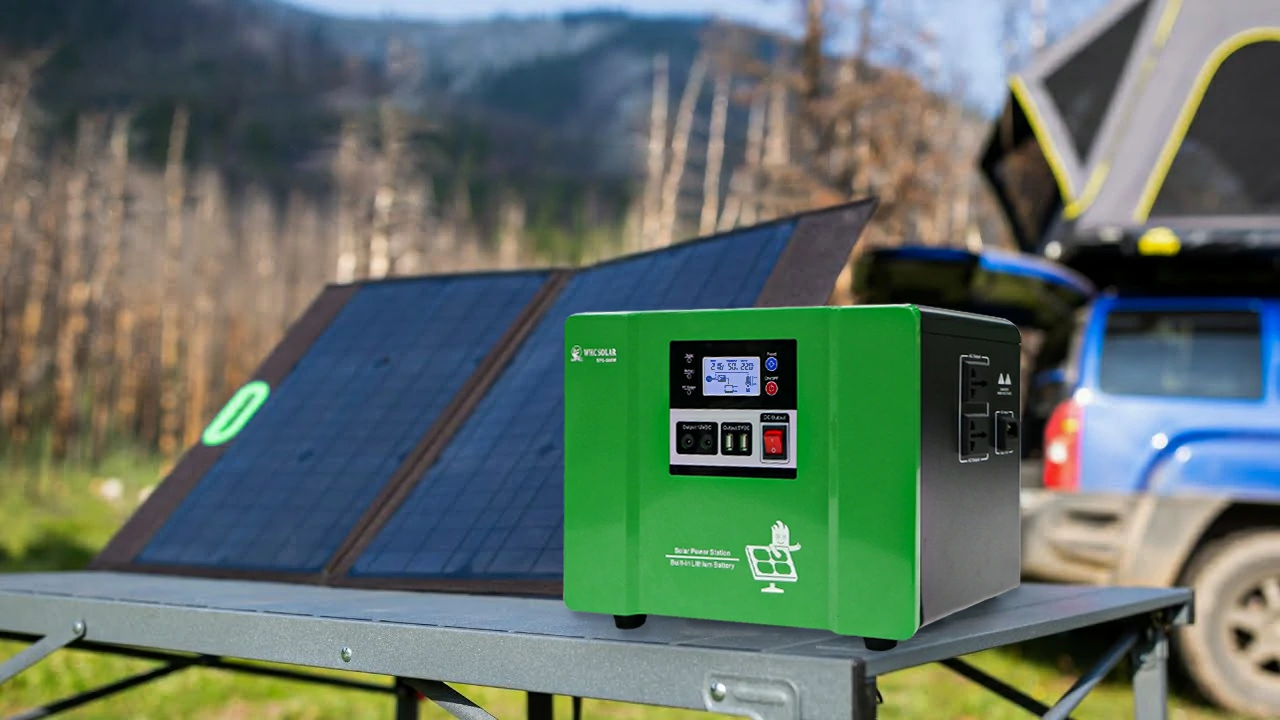There has been a global call for environmental sustainability because of the increasing concern for global warming. Scientists have advised that we embrace renewable energies and substitute them for an energy source that causes carbon emissions into the atmosphere. This has raised many questions and comparisons between gas and solar generators.
Some people ask questions like solar generators vs gas generators, natural gas generators vs solar batteries, diesel generators vs solar power, and a lot of other questions. This blog will give an in-depth comparison between solar and gas-powered generators and advise on which one to get.
Understanding What A Solar Generator Is

There has been an increasing need for a solar-powered backup generator because of the skyrocketing power cost. Also, there has been news of the collapse of the national grid in different parts of the world, and citizens are advised to get a backup power source in case of a power outage. Solar-powered generators can serve as alternatives or backups for the on-grid.
It is important to understand what a solar generator is and it is important to help increase household energy independence and reduce dependence on the national electrical grid.
What Is a Solar Generator?
A solar generator is a power source that uses energy from the sun to generate electricity. Solar generators use sunlight as their means of generating energy. Hence, they do not need fuel. These energy sources are reliable as they do not rely on limited resources like natural gas and oil and do not emit pollutants to the environment.
The energy generated by solar generators can be used for different household, agricultural, and industrial activities, depending on the capacity of the solar generator. They can be used to power refrigerators, light a space, power appliances, or even used as a solar generator for RVs. Industrial portable generators and commercial portable generators are portable generators that can be used in industries for business owners.
In most cases, they are portable devices with four components; the solar panel, battery, inverter, and charge controller.
How a Solar Generator Works

The solar panel helps to trap the energy from the sun. the battery or batteries stores the Direct current energy gotten from the sun and keep it for later use even when the sun is not shining. The inverter converts the DC current to AC which is suitable for household use. A charge controller is needed to control the amount of charge that gets into a battery directly from the sun.
Pros of Solar Generator
Some of the advantages of solar generators are
- Low maintenance – a solar-powered backup generator does not have moving parts, hence you do not have to worry about wear and tear. Also, they are not easily damaged.
- Less pollution – solar generators are noiseless and do not emit exhaust or toxic gases into the environment. There for you don’t have to worry about noise pollution and air pollution.
- They are reliable – they are as reliable as the sun. As long as the sun keeps shining and you have energy stored in your battery, solar generators will not disappoint when they are needed.
Cons of Solar Generator
- It is relatively expensive to acquire and set up a solar generator
- It might change the aesthetic of your apartment if they are not designed with the building.
- The efficiency of a solar generator is dependent on weather and the availability of sunlight.
Understanding What a Fuel Generator Is

Fuel generators are machines that generate electricity by converting fuel into electrical energy. The fuel can be diesel, gasoline, natural gas, or propane. Fuel-powered generators usually operate on the principle of ‘internal combustion’. Fuels and a mixture of air are injected into the combustion chamber of the generator where they are compressed with pistons and ignited with spark plugs.
These generators are often used as backup or main power sources in remote locations and places with limited electricity. The efficiency of the machine or the amount of electricity generated is usually determined by the size of the generator and the fuel consumption rate of the machine.
Types of Fuel Generators
There are different fuel generators, each of which is named based on the fuel they use in their operation.
- Gas generators – these generators use natural gas to generate electricity. Gas is quite cheaper than diesel, gasoline, and other fuel used to power different generators. Since gas is one of the cheapest fuels, gas generators are popular among household users and businesses. This is because they help provide electricity are a relatively affordable price.
- Diesel generators – diesel generators are powered by diesel fuels. Portable diesel generators are commonly used as worksite generators in construction and mining sites. A diesel generator cost a lot to purchase and maintain.
- Petrol generators are usually small, portable generators that run on petrol. They are suitable for camping, and as backup generators during power outages or a major power source for off-grid living.
- Propane generators – Propane generators run on propane and are often used as backup power generators or a major power source for off-grid living.
What Is a Gas Generator

Gas generators use natural gas as their fuel source to provide electrical energy for household or commercial use.
For this generator to work, it requires fuel (natural gas) which is stored in the fuel tank. The fuel is then channeled into the combustion chamber at an appropriate pressure, mixed with air, and made to burn. The energy from the heat produced during combustion is then used to turn the rotors in the generator. This motion generates a magnetic field that is converted into electricity.
Pros of Gas Generator
- Natural gas is widely available in different parts of the world making this generator suitable for use everywhere
- When compared to other backup electricity sources, they are relatively less expensive to acquire and operate
- As long as there is an adequate supply of gas, gas generators are reliable.
Cons of Gas Generator
- Gas generators release pollutants into the environment
- They require regular maintenance to function optimally
- Gas generators use flammable fuels hence they pose a danger of fire outbreak or explosion
Gas Generator vs Diesel Generator
As explained earlier, gas generators use gas while diesel generators use diesel as fuel. They are both types of backup generators for power outages of off-grid living. They both have their advantages and disadvantages.
Here is a comparison of gas vs diesel generator
- Impact on the environment – They both emit air pollutants into the environment. But diesel generators release more pollutants into the environment than gas generators. Also, gas generators are quieter while diesel generators are relatively noisy.
- Fuel efficiency – Diesel generators are more fuel efficient than gas generators. In places where there is a limited supply of fuel, diesel would be preferred over gas generators.
- Maintenance – Gas generator does not require as much maintenance as diesel. To increase diesel generator efficiency, there is a need for regular maintenance.
Solar Generators vs Gas Generators
Even though solar generators and gas generators are great sources of power, they have their advantages and disadvantages. The choice of generator is dependent on the needs of the users, specific requirements, the amount of power needed, and how frequently it is needed.
| Factors | Solar generator | Gas generator |
| Fuel source | Solar generators rely on sunlight to generate electricity | Gas generators rely on natural gas or propane gas |
| Cost | They are expensive to set up but do not accrue a maintenance or running cost. | They are cheaper to acquire but require a continuous supply of fuel and maintenance which is quite expensive. |
| Environmental impact | They do not emit pollutants into the environment hence they are environment-friendly | They emit pollutants into the air and can be harmful to the environment. |
| Noise | They are noiseless | They can get very noisy at times and are not suitable for use in places where noise is not tolerated. |
| Reliability | They are affected by weather or climatic changes. When there is less supply of sunlight, there would be less electrical output | They are more reliable since you do not have to worry about the weather to power your house. |
It is important to weigh the pros and cons of both solar generators and fuel generators and consider your specific needs and requirements before making a purchase. In some cases, a gas generator may be a better option, while in others, a solar generator can be a more convenient and environmentally friendly choice.
How to Choose the Right Generator for Different Applications
The major factor to consider before choosing the right generator is what you intend to use it for. The generator best suited for camping activities might be different from the ones you need for home and construction sites.
The Best Generator for Camping: Solar Generators

For camping and family picnics, there is a need to provide a source of electricity that can charge phones and power other gadgets that are needed for the picnic. The best type of generator for camping activities is one that is easy to carry and set up, safe to use, and reliable. While portable gas generators are easy to carry and set up, they are quite noisy and release fumes into the environment. Also, because of how flammable gas is, they will need extra care and precaution to avoid fire outbreaks.
Although it can take some time to set up a solar generator, when they are up they generate electricity without the noise and fume gas generator gives. Also, they do not pose a threat to fire outbreaks since they don’t use flammable gases.
The Best Generator for Home: Solar Generators

The need for electricity at home cannot be overemphasized. Electricity is needed for heating or cooling the house, cooking, and charging phones, laptops, and other appliances. The best generator for home use would be the one that can meet all the electrical needs at home in a cost-effective way.
Gas generators are known for their large electricity generation. They can power the gadgets used at home including those that have a high power rating. Although diesel generators are suitable for large electricity needs, they do not provide a cost-effective way of meeting these needs. Diesel generator efficiency is increased with regular maintenance at the owner’s expense. Also, diesel is quite pricey.
Solar generators on the other hand do not need regular maintenance, once it is set up, you are good to go! Also, solar generators do not incur daily costs to generate electricity. When using a solar generator, you do not have to worry about buying fuel to run your generator.
The Best Generator for Construction Site
Powerful tools with high power ratings are used on construction sites. Diesel generators for construction sites are preferred over solar power. This is because they do not require time-consuming installation, and they are dependable and capable of generating the electricity needed on the construction site.
Solar generators require a lot of time to set up, and might not be able to generate enough electricity to power the tools used on construction sites.
Things to Consider Before Choosing a Generator
- Power requirements – It is important to consider the power requirements of the equipment and gadget you want to power with a generator. This will help you to make an informed decision.
- Size – Portable generators are suitable for outdoor events and for use on construction sites. Suppose the need for a power generator requires you to move from one location to the other. In that case, portable generators should be chosen over stationary ones.
- Noise level – If you plan to use generators in residential areas, it is important to choose generators with low noise levels. If the generator is too noisy, it might disturb the peace of the environment.
- Environmental regulation – Different countries have different environmental requirements. While fuel-powered generators are allowed in some communities, they might not be allowed in others. Some countries have little tolerance for carbon emissions. Therefore, choosing a generator that complies with your local environmental regulation is important.
- Price – Price plays a very important role in choosing a backup power generator. It is advisable not to go for the cheapest generator, but to compare their running cost to see which is cheaper in the long run. Consider your budget and choose generators that you can afford to buy and run effectively.
Conclusion
Solar and gas-powered generators are both popular backup generator sources for individuals and businesses. They both have different differences, pros, and cons. But due to the pursuit of environmental protection and energy efficiency on the market, solar generators gradually replace gas generators. Solar generators offer a cleaner and more environmentally friendly option.
If you have insight into the potential of the solar generator niche market, contact us today for more information on solar-powered backup generators!

